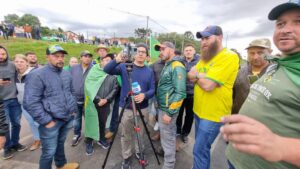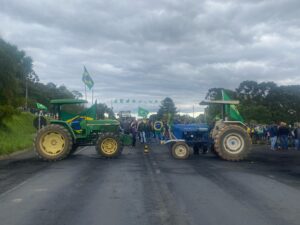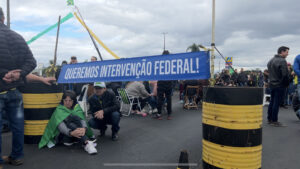
Journalist Issac Risco erases images after being intimidated by protesters. (Photo credit: Marcos Bohler)
Following the triumph of Luiz Inácio Lula da Silva, the next president-elect of Brazil, anti-democratic demonstrations have increased since the beginning of November in at least 20 Brazilian cities plus the Federal District (Brasília). A portion of the citizenry demanded federal intervention and a review of the results of the polls under arguments of alleged electoral fraud.
Since Nov. 1, demonstrations by Bolsonaro's supporters were organized around national and interstate roadblocks with trucks and tractors. The riots occupied prime time on TV news and in the Brazilian press in general. Journalists covering the events were assaulted and intimidated while exercising freedom of the press. According to a report released by the Brazilian Association of Investigative Journalism (Abraji, by its Portuguese acronym), more than 37 press professionals received threats and physical aggressions.
LatAm Journalism Review (LJR) interviewed two journalists in the field: Peruvian Isaac Risco, from Deutsche Welle, Berlin, and a former correspondent of the German Press Agency (dpa) in Latin America; and Brazilian André Felipe Silva Mendonça, from Rede Amazônica de Televisão, a Globo Group affiliate in the state of Rondônia, northern Brazil. Both suffered incidents and intimidation and told LJR about their experiences in the field.
In the state of Paraná, in southern Brazil, Bolsonaro won by more than 62% of the votes in the run-off. As a result, 85 road points were illegally obstructed protesting election results. The pronouncements against the legislative and judicial powers made by the current president Jair Bolsonaro (in office until Jan.1, 2023) have direct consequences for Brazilian journalism.
Isaac Risco was not planning on covering the roadblocks. He ran into them on the road, on his way to interview Ukrainian immigrants and refugees who had arrived in the cities of Prudentópolis, Guarapuava and Curitiba, in the southern Brazilian state of Paraná. "We are having trouble getting there because of the roadblocks," his work colleague warned him.
LJR: What was the mood at the protest when you reached the blocked roads?
Isaac Risco: On the road, we managed to make a detour and avoid the first blockade. When we reached the second one, at the entrance to the city of Prudentópolis, there were two large tractors with Bolsonaro supporters. The atmosphere resembled a kind of popular party. There were children, elderly people, and women. It had the air of a town fair. It seemed peaceful. While we were waiting for them to open the road, we decided to ask people some questions. We started recording. The interviewees told us they believed there had been electoral fraud and were asking the military for an evaluation of the elections. Among those present, one person was circulating with a microphone and was asking for signatures to present to the local armed forces in their barracks.
[In a short time, the tractors would move aside and they would let the vehicles circulate for a few minutes and then close the road again to continue the protest. Meanwhile, Isaac and his colleague continued interviewing.]
LJR: What was the approach by the group that intimidated you while you were reporting?
IR: When we finished recording, a group led by a blond man came. He asked me if the interview was live. I said no, it was recorded. "Ah, if it's not live, you can't keep it," he told us. As more people approached and circled around us, the one who appeared to be the spokesman emphasized that he knew about the manipulation and editing of the footage. Without responding, we decided to leave. At that point, the aggressive protesters searched the internet for articles from Deutsche Welle. One of them said: "They (Deutsche Welle) speak well of Lula." Then they became more aggressive. The one who had intimidated me came back and told me to delete everything. They came closer until they checked on the small screen of my tripod camera that I had done it completely. And, when I was done, they asked me to remove everything from the digital garbage can as well.
LJR: Did you have a protocol and security measures in place?
IR: Yes, but there was no time for anything. One of the protesters started to calm down others who were even more aggressive and wanted to come at us. Two of them followed us to the car and made sure we left. Regarding security, there was something that caught my attention: a little further away, there was the military police. We caught a glimpse of them. And as I was erasing the images, I looked in the distance and wondered to myself why the police didn't lift the blockade at once. And I thought that, if things got more tense, I could turn to the police. Then I called the station to tell them what had happened. I gave them a step-by-step account and tweeted from my account. My boss and another person from the office called me and together we assessed that it had been an isolated incident. That's when we decided to go ahead with our plan to report on Ukrainians in the region.
For Deutsche Welle, the elections in Brazil were considered a tense scenario. We prepared ourselves with the proper protocols, including not driving alone on election night, wearing a helmet and special glasses. I had also taken a safety course for journalists in conflict zones a while back.

Road blocks in Parana state, Brazil. (Photo credit: Isaac Risco)
LJR: What differences in atmosphere did you perceive between the south and other regions of Brazil in these elections?
IR: In the south it seems to me that everything is now more radicalized. I was quite surprised by the level of extremism among the people who were at the protest, in a party-like atmosphere of a town in the interior. It is also surprising that they were literally reproducing a series of fake news. They seem to be middle class people who do not believe in official media and do believe in the danger of communism taking power, which is not going to happen in Brazil. The degree of penetration of this radical discourse based on fake news is striking. In the south, I could see more support for Bolsonaro, which was evidenced by the road blockades. In São Paulo I no longer saw that much presence of the national flag, which was identified with the president's party during these elections.
LJR: What differences in the environment and attacks on journalists did you perceive between the 2018 and 2022 elections?
IR: I remember that in 2018, when I covered the elections that Bolsonaro won, the environment was also very aggressive. I was in pro Bolsonaro marches in the outskirts of Rio de Janeiro and in front of Bolsonaro's house in Barra da Tijuca, where people were quite extremist, wearing black jackets, with flags and patriotic symbols of which they had taken possession until today.
André Felipe is a Brazilian journalist with Rede Amazônica (Globo group) in the city of Porto Velho, capital of Rondônia, northern Brazil. On Nov. 4, he was intimidated by extreme right-wing demonstrators. The demonstrators threw André and cameraman Ruan Gabriel Nascimento out of the place, running and beating them at the door of the station's car.
In the state of Rondônia, the right also won. Bolsonaro obtained 69% of the votes. Marcos Rocha (União Brasil Party) won the gubernatorial election with 52.47%. His opponent, Marcos Rogério (Liberal Party), also aligned with liberal and Bolsonarist principles, obtained 47.53%. The riots on the streets during the first week of November questioned the electoral results for the presidency of Brazil. They closed the Belmont expressway - located on the banks of the Madeira River, a tributary of the Amazon - enabled for the circulation of heavy grain cargo arriving and being distributed to other parts of the country, such as Manaus or Pará. André Felipe's journalistic guideline was to show the blockade of one of the most important roads for the state's agricultural activity.
LJR: What kind of aggression did you experience and how did you protect yourselves?
André Felipe: We knew of the danger, so we made a very careful approach, we were 300 meters [about 1,000 feet] away from the blockade. But a group of men formed and identified us by the station's logo. They approached us with the intention of attacking us. They even said that if we didn't leave, they were going to kill us. I was lucky enough to be near a stalled bus because of the blockade and the driver saw me and told me "get in here to hide." I went in, took cover and from there I was able to film a little more of the group attacking my colleagues. I stayed hidden for a long time until I could get out and meet the cameraman. Everything happened very fast and we could not react well. We expected the worst. Luckily I was able to hide and my colleague was able to quickly get into the car and escape.
LJR: What happened after the aggression, how did it affect you?
AF: Personally, I had a hard time because of jitters, it was psychologically exhausting. We received support from our communication network, from the regional press, from journalists' unions, from ABRAJI, we felt supported. But I am still afraid to move about. I am never alone anywhere. It is dangerous. With our backs turned, we can be surprised and attacked. The feeling is that these demonstrations are against us, as journalists.
LJR: In your professional career, how do you compare this 2022 electoral scenario with 2018? And how are journalists doing in this regard?
AF: The 2018 scenario was not as tragic as it is now. In my ten-year career, I had never gone through such an aggressive electoral coverage scenario. There is a senseless revolt in the population, simply because a candidate for president did not win the elections. But it was the majority that elected Lula. Here, in Porto Velho, there is the Brigade Camp, in front of the Army's Seventeenth Brigade. To this day, there are demonstrators staying there, settled down. What is the reason? We want to know why. And another issue that differs from the 2018 scenario: journalists are treated as enemies. That undermines freedom of expression. At the end of the day, we provide a public service and we work for the citizens.

Road block in a Parana, Brazil road after Bolsonaro’s defeat. (Photo credit: Isaac Risco)
LJR: What limitations do you have moving about Porto Velho?
AF: I don't move around the region of the Army Brigade because we know those protesters are staying there. I don't go to certain places because I know there are Bolsonaro supporters. It looks like a war camp: trespassing the enemy area can cause violence, we don't know what can happen. We are afraid to walk around with the microphone and the Rede Amazônica logo. What we did to avoid attracting attention was to remove all the station's identification logos from the cars.
LJR: In the Red Amazônica, do you follow security protocols?
AF: Both Grupo Globo and Rede Amazônica offered us security measures to take care of ourselves, including on social media. Everything we publish is important and decisive in that sense. It is not that we keep ourselves from giving an opinion on social media, but we must be careful, it is a protection measure. We prepare the messages carefully, for example: If it’s about politics, regardless of which side it is, I avoid posting them. The other measure is not to get too close to these people, both during and outside of work. We learned to be more alert. I want to be at peace. They treat us as if we were the ones who decided who won the presidential election.
LJR: How are these attacks on journalists related to the political marketing messages coming from the hardest core of Bolsonarismo that is against the press?
AF: There is a direct relationship. In recent years, journalists have experienced a lot of disrespect from President Bolsonaro. When I saw colleagues being questioned by the president, I always put myself in the shoes of the reporter who was there, doing his job. If we question it is because we want to know. It's not because we want to politicize or argue, it's because we want to clarify something for the audience. But those authoritarian attitudes end up being unfavorable to governments. In Rondônia, for example, the governor-elect is an ally of Bolsonaro. Yet his attacks on the press damaged his public image, putting him in a very delicate situation with local journalists.
Recently, there was another attack on the journalistic community of Rondônia. This time, shots were fired at the headquarters of the local website Rondôniaaovivo. Hundreds of demonstrations repudiated the incident, such as the Press Workers Unions.
Thirteen organizations that defend freedom of expression and the press asked authorities and public officials to guarantee journalistic work in the current transition period between the governments of Bolsonaro and Lula and until the inauguration of the new president in January 2023.
--
Contributor Soledad Dominguez is a journalist covering and writing stories on human rights, racial equality and innovation in journalism in Argentina and Brazil.